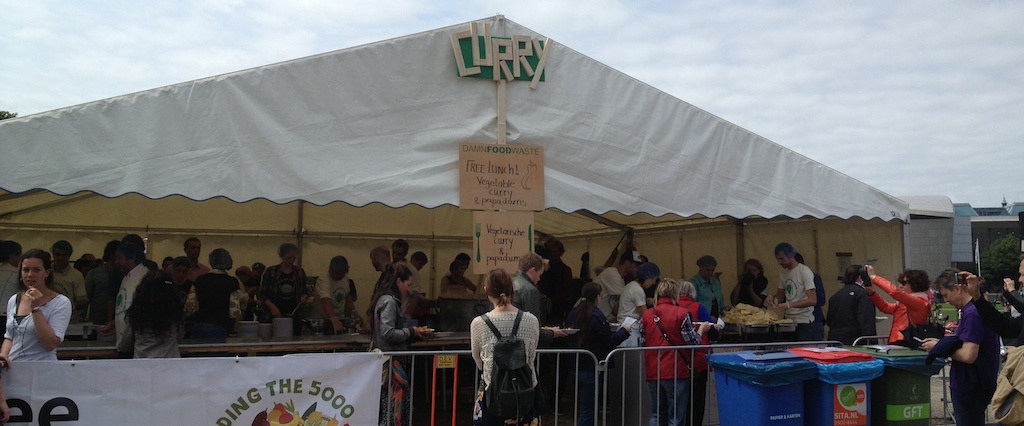Last Saturday I enjoyed a free lunch at the Damn Food Waste event at Museumplein, Amsterdam. Damn Food Waste served a lunch to over 6000 people consisting of perfectly good, fresh food that, for various reasons, would not end up on our plates otherwise. In a world where people are still starving, the amount of food wasted is staggering. Events like Damn Food Waste are taking place all over the world and they are part of a global movement against food waste that aim to tackle food waste and promote the delicious solutions to food waste internationally!
I’ve had a really bad experience when it comes to tasting waste so I was a bit hesitant at first to grab a free lunch. When I was a student, I was once offered a free lunch at university by a group of students. It turned out to be a similar initiative to Damn Food Waste but with a very different twist. After enjoying lunch with my class mates, we were in for a surprise. We were told that all the ingredients from the foods we had eaten, were taken right out of the trashcans of the Albert Heijn supermarket a few days before. Food, that had been thrown out because it no longer looked good or had reached its expiry date.
Many people were shocked to find out they had been eating food right from the thrash can. I even remember being quite disgusted at first. The yuck factor was clearly the power behind the experiment, our disgust got us into thinking about the food we regularly throw away and how one man’s waste could be another man’s treasure. I really had to cross a mental barrier. You grow up with the idea that thrash is dirty and unclean. Unfortunately, in this case it was, as I got food poisoning afterwards. A few months later I got food poisoning again after eating at a friend’s house. She later told me that one of the products she used for her stew was a few months past the expiry date but she thought it would be ok.
Instead of becoming more mindful about my own food waste, these two experiences got me into wasting more food. I became very hesitant about eating foods that were close to their expiry date. On the day before the expiry date, I would throw out perfectly good-looking food without even smelling it or looking at it. I didn’t want to run the risk of getting so sick again. I do believe we feel disgust for a reason, it’s our natural instinct, our gut, telling us, if something’s right or wrong. Long before we could buy our food in supermarkets, our sense of revulsion was a useful tool for disease prevention. Our sense of disgust would literally keep us away from things that were harmful to us, like rotting meat, disease-carrying rats or poisonous insects. Nowadays, we no longer use our instinct to decide what’s right or wrong. And as our food comes pre-cut and pre-packaged, we have lost the connection to the foods we eat. We decide whether a product is still ok to eat by looking at the expiry date first, instead of using our instinct. Trusting our intuition is very important when it comes to food and to reducing our own food waste. Our instinct helps us to select the foods that are right for us; it helps us to use food and engage in food in a way that nourishes us. It helps to become more mindful consumers and eaters. We gain a deeper appreciation for the food we eat and we buy only what we need to support ourselves.
Damn Food Waste, importantly, did not prepare the lunches with food that was taken from the trash. Instead, they used fresh food that would otherwise end up in the trash for cosmetic or other reasons: too crooked, ill shaped or from a damaged container or wrongly labeled container. I enjoyed my fresh lunch and it was exciting me to see so many people coming together to take a stand against global food waste. I have come a long way when it comes to re-thinking waste. I value the food on my plate and I eat and consume mindfully. I hate it when I have to throw food out. Nowadays I use my instinct to decide whether a food is still good to eat. And I have become clever when it comes to reducing my own food waste. A big part of fighting global food waste is building a deeper relationship to the food we eat. When we know where our food comes from, when we eat mindfully and view our food as nourishment instead of convenience, it becomes much harder to waste food.
We rarely think about the impact of our own food waste. Those crumpled up veggies we throw into the garbage at the end of the week or the items we find in the back corner of our kitchen cabinets that are well beyond their expiry date are just part of life for most of us. However, the food we waste as consumers is a big part of global food waste. Research shows that an average consumer in The Netherlands throws out 14% of the food he or she buys per person per year. This comes down to around 50 kg of food per person. Drinks, like coffee or tea, are excluded from this calculation. In the Netherlands we, as consumer, waste 0,8 billion kg per year. This comes down to €2,4 of food per year.
The food industry is responsible for another €2 billion of food waste. We are talking about food that is too good to waste. You think Fashion models have to meet very strict requirements in order to model? Well, your fruits and veggies need to follow similar requirements for size, weight and height. Apparently, 5-10% of the food in our food chain is wasted because it does not meet standardized ideas of what it should look like. Imagine strawberries that are too small, cucumbers that are crooked or potatoes that have an odd shape.
The event Damn Food Waste helped to raise awareness of the global problem of food waste. It directed its attention not only towards consumers, but also to food processing companies and politicians in order to come up with solutions to battle food waste. You can make a difference by reducing your own food waste. Find out here what can you do to reduce your food waste.
Here’s my 13 tips to stop wasting food
- Buy odd-shaped produce. Buy veggies that fit out, like an odd-shaped tomato or a crooked cucumber. Despite their weird look, they are not Franken foods (processed foods are). This is just nature expressing itself in all its diversity. These foods may show imperfections but still are full of flavor and nutrients. Buying odd-shaped fruits and veggies will stimulate farmers to sell veggies and fruits that have imperfections instead of throwing them away.
- First in first out. Always use your oldest items first. We sometimes end up buying lovely fresh produce and are tempted to eat the things that appeal to us the most first. By placing your oldest items in the front of your refrigerator, you will likely use them up first.
- Use your instinct. Don’t just throw things away because the expiry date says so. Use your instinct and listen to you gut, your sense of smell and taste, to decide whether you can still eat something.
- Shop for what you actually need. We get tempted into buying food we don’t need. Plan ahead and buy food. Buy less food when you go shopping or shop more frequently buying only a few groceries each time you go shopping. Buy fresh foods, like salad greens or berries, on the same day as you plan to use them. Always eat foods with a very short life span like figs on the same day.
- Juice it up! This is my personal favorite. At the end of the week, on Friday, I juice all my leftover fruits and veggies. This way I hardly ever have to throw out fresh produce and you end creating surprising new juice combinations.
- Can or freeze in-season produce. This way you can use beautiful produce all year around. For example, I cut up my veggies when they are fresh and freeze them so I can use them later in my smoothies. I have containers with frozen bananas, chunks of mango etc.
- De-clutter your kitchen and your refrigerator. When you are able to see in one blink what ingredients you’ve got at home, you are less likely to throw food away. We often end up throwing things away because they get lost in the back corner of our kitchen cabinets.
- Grow your own food. Growing herbs and salad greens is easy, even when you live in the city. You always have fresh produce at hand and, as long as you water the plants, you have always something to eat at home.
- Make food the center not the periphery of your life. Appreciate your food, consume mindfully and eat consciously. By creating a deeper relationship to the foods you eat, you are less likely to waste it.
- Get creative in your kitchen. If you have any random veggies lefts, make a nice soup or stew. Or make pizza or frittata using leftover veggies
- Buy your foods at local shops or local farmer’s markets where food is still valued. When you know where your food comes from and you see the passion of the people that are producing it, you are less likely to act mindless and waste food.
- Set your refrigerator temperature right. Sometimes we have to throw food out because our refrigerator is either too cold or too warm or not working properly.
- Set an intention. Commit yourself to reducing the foods you waste. Sign the pact here (Dutch or English).
Get inspired!
- Get your crooked and ill-shaped veggies here.
- Watch this Ted Talk by Tristram Stuart on The global food waste scandal.



Leave a Reply